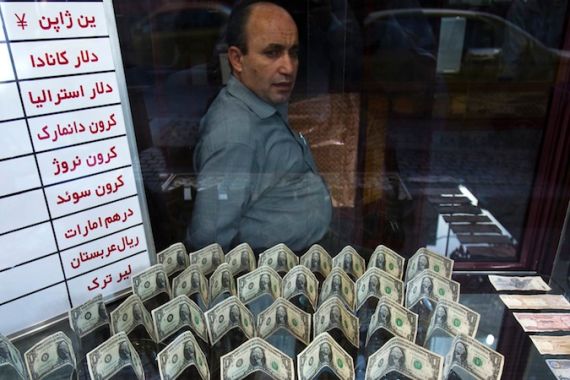Iran blasts ‘enemies’ as currency plunges
Ahmadinejad says “enemies have reduced oil sales” after rial loses more than a quarter of its value over the past week.

Mahmoud Ahmadinejad, the Iranian president, has rejected criticism of his policies and insisted his country could ride out the sanctions, imposed because of the nuclear programme, after the rial lost about a third of its value in a week.
“Enemies have managed to reduce our oil sales but hopefully we will compensate for this,” Ahmadinejad told a news conference in Tehran on Tuesday.
Keep reading
list of 4 itemsA flash flood and a quiet sale highlight India’s Sikkim’s hydro problems
Why is Germany maintaining economic ties with China?
Behind India’s Manipur conflict: A tale of drugs, armed groups and politics
He suggested domestic criticism of him was part of a “psychological war” against the Islamic Republic.
“According to a report from one of the security services, 22 individuals are ringleaders of the recent turmoil in the currency market, and since these individuals are known, security institutions must act,” Ahmadinejad said.
“Everyone is aware that foreign trade and commerce don’t have a very high share in the Iraninan economy. But the figures are being used in the psychological war for a greater effect on the markets. The number of US dollars being exchanged in our country is not that big. But some people are mixing the internal situation and external trade.”
The rial has lost more than a quarter of its value against the dollar over the past week, a sign that Western sanctions are having a serious impact on the country’s economy.
‘Tough sanctions’
Mahjoob Zweiri, professor of contemporary Middle Eastern History and Politics at Qatar University, told Al Jazeera that while many within the establishment blame the west for the country’s economic woes, “there are a good number of Iranians who blame the policies of Ahmadinejad.”
“Ahmadinejad came to power in 2005 with the slogan that he will fix the economy. Now it sounds like, after 8 years, this has not happened.
“There is a major problem with the Iranian economy for years now. This is an economy within a revolutationary state.
“More importantly Iran has faced tough sanctions from Europeans, and the United States and these sanctions are unlikely to have no impact on the Iranian economy.” Zweiri said.
|
“This speaks to the unrelenting and increasingly successful international pressure that we are all bringing to bear on the Iranian economy“ – Victoria Nuland, |
The losses include a 17 per cent drop in one day: The black-market exchange rate plunged to about 34,500 per dollar on Monday, down from Sunday’s rate of about 29,600, according to currency-tracking websites. (The official rate remains has been pegged at 12,260 rials on the dollar for several years.)
The decline comes after a week of tough talk at the United Nations, where US President Barack Obama said his country would “do what we must” to stop Iran from acquiring nuclear weapons, and Israeli Prime Minister Binyamin Netanyahu hinted at a military strike next year.
The US and European Union have imposed increasingly-tough economic sanctions to pressure Iran into suspending its nuclear programme. Iran insists that the programme is for peaceful purposes.
The International Atomic Energy Agency said in its latest report that Iran was blocking access to one site suspected of conducting research connected to nuclear weapons.
Inflation fears
The rial’s collapse also comes after Iran opened a new currency “exchange centre” in Tehran to supply dollars to importers at a special rate. The launch was supposed to ease their fears about the availability of dollars, but it may have backfired, intensifying the demand for foreign currency.
| Iran hit by oil embargo and ‘mismanagement’ |
Some Iranian officials insisted that the depreciation would be temporary.
“The exchange centre is operating and once the next phase of the plan is implemented, the price of curency will drop,” said Gholamreza Mesbahi-Moghaddam, who head’s parliament’s planning and budget committee, according to the Mehr news agency.
Inflation, already running at more than 25 per cent, will almost certainly rise as the rial deteriorates. Rising costs could worsen the job losses which Iranians say are hitting the country’s industrial sector.
At the end of last year, Iran had $106bn of official foreign reserves, enough to cover about 13 months of imports of goods and services in normal times, according to the International Monetary Fund.
But Nader Habibi, an economist at the Crown Center for Middle East Studies at Brandeis University in the US, estimated last month that the government now had about $50bn to $70bn left. Iran does not disclose timely information on its reserves.
Victoria Nuland, the spokesperson for the US state department, said that the depreciation was linked to Western sanctions.
“This speaks to the unrelenting and increasingly successful international pressure that we are all bringing to bear on the Iranian economy,” she said.
Nuland went on to acknowledge that “any depreciation of currency is always going to affect the people who use the currency,” but would not say whether the US was concerned about the impact of the currency collapse on civilians.